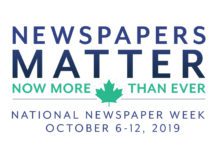by Dave Adsett, Publisher, The Wellington Advertiser, Fergus, ON
Every town has one. In Fergus, his name is Ian.
He is a champion of history, safeguarding a vast collection of newspapers titles at the local archives. Some titles pre-date Confederation but in recent years his workload has markedly slowed.
This region has lost its share of newspapers as seasoned publishers faced with shrinking subscription income, diminishing advertising revenue and ever-increasing costs, gave up and closed titles. Oddly, it isn’t that news isn’t wanted, it is that people mistakenly believe it can be had at no cost.
Nine in ten Canadians derive their news from trained journalists each week although a scant 20% value it enough to pay a fee to receive it. Advertisers, an essential part of the business equation for traditional media, continue to reallocate their ad dollars with online marketers—even though published surveys identify traditional Canadian media platforms as a more trusted source.
Ironically, 70 per cent of those online ad dollars are now spent with Google and Facebook—two U.S.-based, global conglomerates. An American study, The Knight Commission on the Information Needs of Communities in a Democracy, concluded that news is as vital to democracy as “clean air, safe streets, good schools and public health”. Governments across Canada, however, continue to rush headlong into the digital age by shifting advertising to these two companies with virtually no regard for Canada’s cultural identity, let alone integrity.
In a recent Ipsos-Reid poll, 63% of Canadians were unable to distinguish between real news sites and fake news stories. Truth seems to be a casualty.
Perhaps that is why a generally stoic Ian, introduced at the beginning of this column, recently became quite emotional when discussing newspapers and their role within a democracy. You see, he is not just a keeper of history; he is a student of history.
The volumes and issues of newspapers past hold clues as to how corruption breeds, democracy wanes and tyrants come to power. Seldom has tyranny taken root overnight, and in virtually all cases, impairing the ability of journalists and destroying a free press are part of the process to destabilize a free society.
This National Newspaper Week, we hope Canadians will support and encourage journalists because newspapers matter—now more than ever. Pledge your support for newspapers at www.newspapersmatter.ca.









For me, newspapers would matter, if I found they responsibly covered what (in my mind) logically should matter most—climate change via global warming, not to mention some major ecological threats.
As but one example of such concern: An April 21, 2017 Peach Arch News editorial just before Earth Day, titled “Earth Day in need of a facelift”, stated that “some people would argue that [it] … is an anachronism”, that it should instead be a day of recognizing what we’ve accomplished.
“And while it [has] served us well, in 2017, do we really need Earth Day anymore?”
This notion was to me so absurd that I mused as to whether Black Press’s climate-change-doubter and fossil-fuel-supporter syndicated columnist Tom Fletcher had penned it.
Right—we’re doing fine without Earth Day’s emphasis on our serious polluters.
Indeed, a few months following the editorial, it was officially declared that Imperial Metals would not be charged for its Mount Polley mine’s massive tailings pond release in 2014 of a slurry of years’ worth of waste into Polley Lake, regardless of the provincial environmental authority’s notation of the company’s clear recklessness.
Also, newspapers don’t matter to me when their professionals seem consistently unwilling to critique their peers at other outlets whose objectivity in their coverage of climate change and/or the fossil fuel industry has been, at best, lacking thoroughness.
What there seems plenty of, however, are the distraction news products.
Thus, regardless of important social issues sensitively covered, I’ve found that the cliched descriptive phraseology ‘the liberal media’ has become increasingly depressingly inaccurate.
Perhaps it’s a profession that’s become motivated more by a buck and a byline—i.e. a regular company paycheque and a frequently published name with stories—than a genuine strive to challenge the powers-that-be in order to truly comfort the afflicted and afflict the comfortable in an increasingly unjust existence.